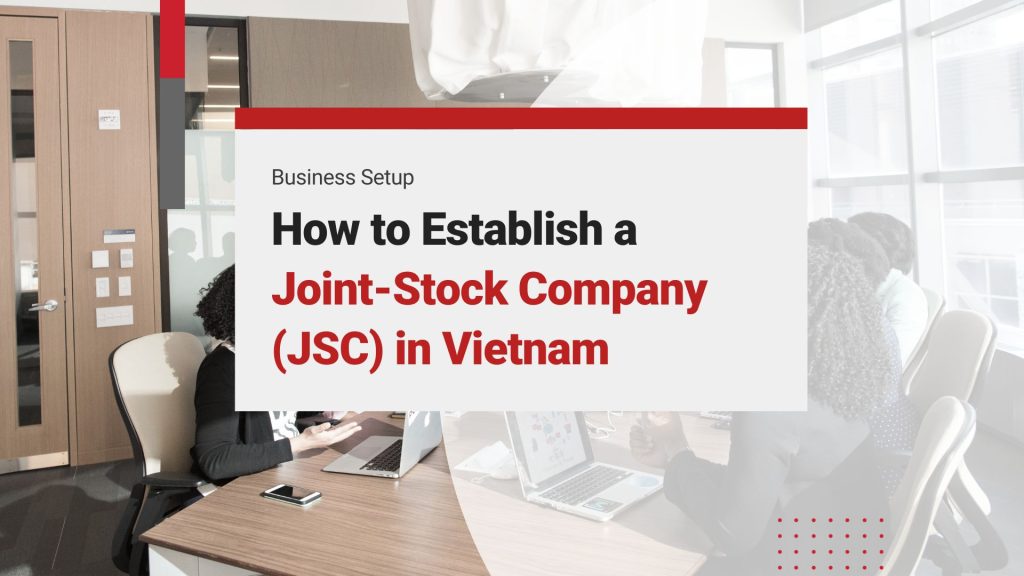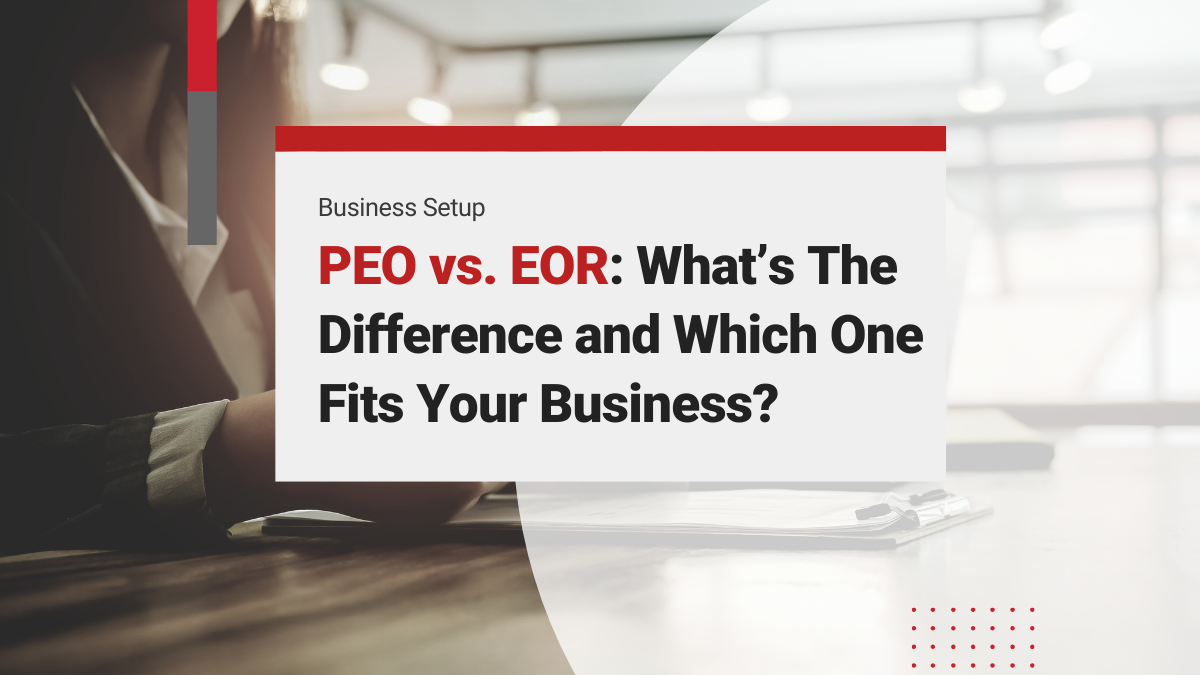A Joint-Stock Company (JSC) in Vietnam is one of the two commonly chosen business entities founded by foreign direct investors with more than three shareholders. It offers a higher level of flexibility for medium and large-sized companies with multiple shareholders, allowing for profit-generating activities, listing on the stock exchange, and more. A JSC Vietnam is typically meant for large companies that eventually want to be listed on the stock exchange. If this fits your requirements, keep reading. Before deciding on a JSC structure, investors are recommended to explore company formation options to understand entity types, shareholder requirements, and listing pathways.
Definition of the Joint Stock Company in Vietnam
A Joint-Stock Company (JSC) is a legal company whose charter capital has been divided into equal shares for each shareholder, following Vietnam’s Law on Enterprises 2020. There must be at least three stockholders. Regarding the maximum number of stockholders, there are no restrictions.
The shareholders can be of any nationality. As a result, the nationality of shareholders in a foreign-invested JSC Vietnam can be structured as
- Solely owned by foreigners
- A joint venture between foreigners and locals
Contrary to a Limited Liability Company, a Joint-Stock Company in Vietnam can issue shares and list them on the stock exchange publicly. By doing this, you can mobilize capital, sell shares, and raise funds more easily. In this article, we will tell you more about a joint-stock company in Vietnam concerning, its structure, advantages, requirements, and setup process.
Joint Stock Company (JSC) Vietnam: The Organizational Legal Requirements
The corporate structure of this type of entity is more complex than a limited liability company due to its larger capital contribution size and suitability for medium and large corporations.
In Vietnam, a Joint-Stock Company must consist of the following:
- Management board supervised by an annual general meeting and an inspection committee
- A management board’s chairman
- A director or general director will also be appointed as the legal representative of the company
For a legal representative who is a foreign national, Vietnamese laws require them to obtain a work permit and TRC (Temporary Residence Card). They should also have at least 12 months of work experience in a managing position or equivalent.
Detailed Corporate Structure of a Joint-Stock Company
General Shareholder Meeting
This is the top body consisting of all shareholders for decision-making on critical issues in a company. A general meeting must be held annually. It requires a director or directors to present the annual report on the strategy and performance of the company.
Board of Directors
The Board of Directors (BOD) is the governing body of a joint-stock company. The Board of Directors has full power, on behalf of the company, to decide and execute the rights and obligations of the company, except for the ones under the authority of the General Shareholder Meeting above. The BOD consists of 03 to 11 members, all of whom are specified in the company’s charter. It may vary from company to company, but the BOD has regular members and independent members (if necessary).
Board of Supervisors
The General Shareholder Meeting will elect independent supervisors to form the Board of Supervisors. Its function is to monitor the activities of the Board of Directors and Managing Director for the transparent administration of the company and reports to the General Shareholder Meeting.
When a JSC Vietnam has more than 10 shareholders or one of the corporate shareholders owns at least 50% of the shares, having a Board of Supervisors is a must.
Chairman of Board of Directors
The Board of Directors is to appoint a Chairman, who may concurrently be the Managing Director. He will act as the chair of the General Shareholder Meeting and meetings of the BOD. Unless specified otherwise in the company’s charter, the Chairman of the Board of Directors is the company’s legal representative.
Managing Director or General Managing Director
The Managing Director is the one who runs the company’s business operations daily. This position is appointed or hired based on a labor contract, each term lasting no more than 5 years, although he may be reappointed subsequently. This Director manages the company under the supervision of the Board of Directors and the Board of Supervisors. He may take the role of the legal representative of the company if specified in the company’s charter.
Types of shares issued by a Joint-Stock Company in Vietnam
Shares of a joint-stock company are also regulated by the Law on Enterprise 2020, with two main types: ordinary shares and preference shares. The description and requirements of preference shares are specified in the company’s charter.
Ordinary shares may not be converted into preference shares, although a resolution from the General Meeting of Shareholders may convert certain preference shares to ordinary ones.
Investing in Vietnam? Find Out About InCorp’s Incorporation Services in Vietnam
Methods of raising capital for a JSC Vietnam
- Transferring shares to other shareholders: Shareholders are allowed to transfer their ownership of shares to another shareholder freely without the consent of other shareholders.
- Transferring shares to non-shareholders: Shareholders are allowed to transfer their ownership of shares to individuals outside of the board freely without the consent of the board.
- Issuing shares on a public stock exchange: Once the company has a public listing, shares can be bought and sold with very little regulation.
Advantages of a Joint Stock Company (JSC) Vietnam
When talking about the limited liability of shareholders, a joint-stock company is highly beneficial to shareholders personally. Shareholders are only liable for losses or debts that will not exceed the amount they have personally contributed.
Hence, once the company is public this also allows the trading of shares anonymously, as well as prevents creditors of the company from becoming stakeholders.
Apart from that, shareholders can transfer their ownership of shares to others without the consent of other shareholders.
Additionally, if there is an increase in funds, a joint-stock company in Vietnam is required to hire a chief accountant as well.
Limitations of Starting a Joint-Stock Company
A joint-stock company’s flexibility in share distribution comes with its drawbacks. To form a JSC, the founders must comply with numerous legal formalities, including documents for the Department of Planning and Investment, registration & license fees, not to mention capital raising.
Additionally, during the company’s operations, provisions of the law are generally stricter than smaller entities. To meet these requirements, company-wide decisions are more time-consuming and impersonal. More specifically, the Director, Board of Directors, Board of Shareholders, and the Board of Supervisors all have to authorize an act. However, the decision may still not take into account the minority.
Public Listing on the Stock Exchange
One thing to take note of is that a joint-stock company in Vietnam is not required to be listed on a stock exchange publicly during its initial founding stage.
A public listing is an available option for JSCs with over VND 30 billion in charter capital, over one year of operation, having reported profits in the previous year, and no overdue debt, among other things.
Other than that, all founding shareholders must register and jointly subscribe at a minimum of 20% of the ordinary shares that are offered for sale to the public.
Requirements Documents for the Incorporation of a JSC Vietnam
Even though this type of legal entity is quite popular for medium and large projects, the process and requirements of establishing a JSC are more complicated and time-consuming, along with more stringent requirements.
Some of the required documents are as follows:
- A bank statement to show the funds available for investment in Vietnam
- Investment project proposals
- Documents to apply for an investment registration certificate in Vietnam
- Legal immigration status certificate for all founding shareholders
- Personal details of all shareholders and amount of shares allocated
- Copies of Passports of all Shareholders
- Land use proposal or office lease agreement
- A foreign investment certificate
- An annual return submission
Audited financial statements of the corporate shareholders (if applicable)
Our Recommendation
A joint-stock company can be an excellent option compared to a limited liability company if the size requirements of the business fit your plan. This happens when you plan to join forces to raise funds with several partners — through the issuance of shares and equity.
If raising capital and joining forces are not your main objectives, a limited liability company with a less complicated management system might serve you better.
In any case, InCorp Vietnam is here to assist you with every aspect of your business, both domestically and internationally. We provide professional market-entry solutions, legal advisory, and consultancy services to ensure the productivity and efficiency of your business in Vietnam.

clients worldwide

professional staff

incorporated entities in 10 years

compliance transactions yearly
Learn the Right Setup for Business
Expansion in the Vietnam
Frequently Asked Questions
How Does A Joint Stock Company Work
- A joint stock company operates by pooling capital from multiple investors who purchase shares, making them partial owners. Profits are distributed as dividends, and shareholders' liability is limited to their investment. The company is managed by a board of directors elected by the shareholders.
What Does Jsc Mean
- JSC typically stands for "Joint Stock Company," a type of business entity where ownership is divided into shares held by shareholders. It can also refer to the "Judicial Service Commission" in legal contexts.
What is an example of a joint stock company?
- An example of a joint stock company in Vietnam is Vinamilk (Vietnam Dairy Products Joint Stock Company). It is publicly listed on the Ho Chi Minh Stock Exchange and has multiple shareholders who own shares that can be traded on the stock market.






